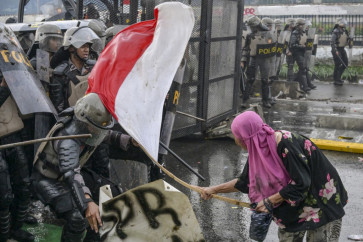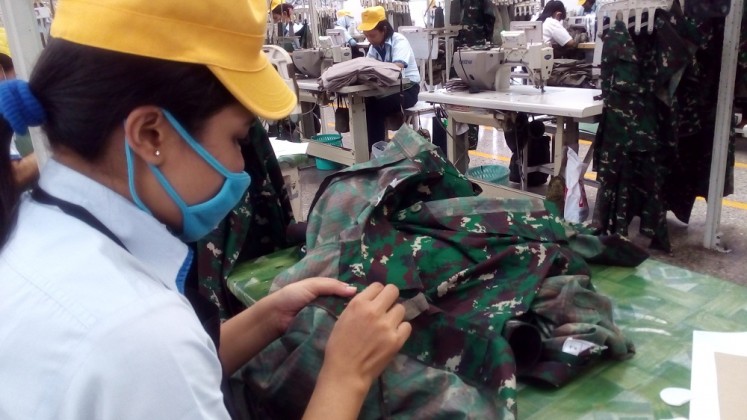Popular Reads
Top Results
Can't find what you're looking for?
View all search resultsPopular Reads
Top Results
Can't find what you're looking for?
View all search resultsGovt still pondering action for IS returnees: FM
Brothers and sisters: People attend a memorial service at Santa Maria Catholic Church in Surabaya, East Java, on May 13 to remember the victims of suicide bombings carried out by an Islamic State-inspired family
Change text size
Gift Premium Articles
to Anyone
B
rothers and sisters: People attend a memorial service at Santa Maria Catholic Church in Surabaya, East Java, on May 13 to remember the victims of suicide bombings carried out by an Islamic State-inspired family.(AFP/Juni Kriswanto)
While many countries assertively reject Islamic State (IS) group sympathizers seeking to return to their homelands, Indonesia has remained cautious about deciding on the fate of the foreign-aligned terrorist fighters and their families.
According to research by the London-based International Center for the Study of Radicalization (ICSR), hundreds of Indonesian women and children left the country to follow family members who had joined the militant group. In 2018, there were about 800 IS sympathizers, including 113 women and 100 children who were still being detained in Kurdish-run prisons in Syria.
The recent death of IS leader Abu Bakr al-Baghdadi is feared to have sparked a new wave of retaliation from sympathetic groups around the world, prompting various responses from the international community.
In Europe, for instance, the Danish government announced on Oct. 11 that it would fast-track legislation allowing people with dual citizenship who had gone abroad to fight for militant groups to be stripped of their Danish nationality, Reuters reports.
Malaysia, on the other hand, is on high alert in case more IS fighters are homebound — its police chief has said 11 Malaysians had returned to date, with eight men charged in court and convicted of terror-related activities, the South China Morning Post reports.
Meanwhile, Indonesian officials are still on the fence about what to do with possible returnees.
“We have yet to reach that phase [of decision making] as we are still coordinating [efforts],” Foreign Minister Retno LP Marsudi told journalists on the sidelines of the 12th Bali Democracy Forum in Nusa Dua, Bali on Thursday.
“There are debates over the issue and there has been no unanimous agreement thus far.”
The minister defended Jakarta's extra-cautious approach to making a final decision, noting that the debate on allowing returnees back was an intense matter even in places like Europe.
Retno hinted at disagreements among relevant stakeholders on how to best “respond to such a situation”, but she did not elaborate. She also made no mention of any definitive deadline to find a solution.
Without any clear instructions from the central government, the National Counterterrorism Agency (BNPT) cannot proceed with the necessary steps to respond, the deputy for international cooperation, Andhika Chrisnayudhanto, has said.
The BNPT, along with the Foreign Ministry and the National Police’s Densus 88 counterterrorism squad, is in charge of the deradicalization of former combatants, a program that proved successful in the past. However, unlike last year, when 17 Indonesian IS returnees were repatriated, the government is now faced with a different problem.
One of the biggest security concerns to emerge recently was that women appear to be just as prone to radicalization as men, following bomb blasts in Sibolga, North Sumatra, and church bombings in Surabaya, East Java, that involved women.
Retno said that most of the women still being detained were to some extent aware of what they were doing in Syria and of the impending consequences, despite also facing hardship there. “Yes, some of them are also victims, but I think most are aware of their intentions,” the minister said.
However, Retno reiterated the state’s commitment to putting humanity first in any repatriation effort and to use extra care in dealing with women and children. The first step was to correctly identify Indonesian citizens stranded in Syria and then decide on a course of action on a case by case basis, she said, echoing previous statements.
In August, the Jakarta-based Institute for Policy Analysis of Conflict (IPAC) suggested in its report that Jakarta should begin to "identify vulnerable groups and prepare pilot projects for return, rehabilitation and reintegration".
It said the government could begin to repatriate some of the most vulnerable citizens first, such as unaccompanied children, while postponing any decision about some of the adults.
“There’s no need to wait for an all-encompassing policy to begin to bring back those most at risk,” says IPAC director Sidney Jones.
“The government doesn’t have to decide what to do about 200 people — it can start with five or 10.” (tjs)










